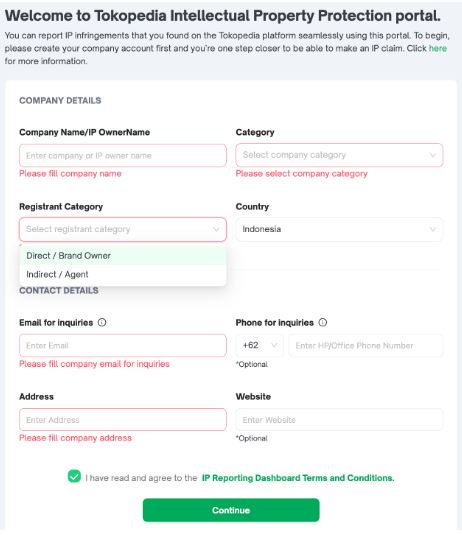According to the Priority Watch List (PWL) 2023 report, the United States Trade Representative (USTR) still places Indonesia, Argentina, Chile, India, Russia, China, and Venezuela on an investment blocklist because it is prone to piracy practices. In particular, the Notorious Markets for Counterfeiting and Piracy 2022 report, also released by USTR, listed various Indonesian sites on the watch list.
Even though in October 2021, Indonesia’s five largest e-commerce companies, namely Tokopedia, Shopee, Lazada, Bukalapak, and Blibli, signed a law enforcement cooperation agreement in the field of Intellectual Property (IP) together with the Directorate General Intellectual Property, Criminal Investigation Agency, and the Directorate General of Customs and Excise. Their target then was clear: Indonesia was released from PWL 2022.
In fact, since 2018, Indonesia is still on this list. Specifically, USTR stated that U.S. rights holders continue to face challenges in Indonesia concerning adequate and effective IP protection and enforcement. There continues to be widespread piracy and counterfeiting, and concerns regarding IP enforcement remain, including lack of enforcement against counterfeit goods, and the lack of deterrent-level penalties for IP infringement in physical markets and online.
Furthermore, USTR provides lays out the current challenges faced by and improvements made by Indonesian e-commerce that are on the watch list.
Challenges
In general, right holders note a high volume of counterfeit products, with some openly labeled “replicas” of branded products. Several e-commerce sites have established notice and takedown processes and have made several improvements to their anti-counterfeiting systems, but right holders continue to push for the sites to invest more significant resources into developing proactive anti-counterfeiting protocols, as well as into increasing the speed of takedowns and transparency of takedown procedures.
Right holders have also expressed frustration with several e-commerce sites’ “repeat infringer” policy, which states that sellers with more than three infringement reports submitted by the same brand are “eligible” to be taken down, instead of “will be” taken down. Right holders state that both the site’s “repeat infringer” policy and “major infringer” policy require brands to expend significant effort and resources to report infringement, and they urge the sites to instead use proactive measures like keyword filtering to allow for automated removal of counterfeit listings.
Progresses Made by E-Commerce Sites in Indonesia
Despite the challenges, the aforementioned sites have ramped up their efforts in battling against the counterfeits. In 2022, Shopee launched a pilot program for its new brand protection portal and, with a newly hired global brand protection director, increased its engagement with right holders. Whereas Tokopedia launched its new Intellectual Property portal to increase the ease and efficiency of submitting notices of infringement and tracking the progress of the resolution of the notices.
Additionally, right holders have noted that Tokopedia has invested resources in a seller education campaign and has implemented some new technologies to increase proactive monitoring of product postings, that could detect and remove counterfeit listings before they are shown to users. Tokopedia also introduced the “penalty points” system and repeat offender system to counter the evergrowing counterfeit demands and markets.

Reporting counterfeit goods helps to protect consumers and businesses from being harmed by these illegal products. It also helps to ensure that the e-commerce platforms are fair and safe for everyone to use. But as seen from the screenshot above, for us to report counterfeit products, there is already a limit that only the owner or their authorized representatives can report. In other words, complaints for listing takedown or removal of goods from e-commerce, from ordinary users who have nothing to do with the owner of the Trademark or Copyright cannot be continued. On the other hand, this policy prevents false reporting from disturbing users.
Then if you are indeed the right holders or official representative, what documents are needed for reporting and requesting the removal of goods from e-commerce?
Documents Required for Trademark Infringement Report
- Proof of Trademark ownership in the form of a Trademark; Certificate that has been registered and issued by the Ministry of Law and Human Rights of the Republic of Indonesia, or similar documents;
- Recommended Retail Price (RRP) from Trademark Owner;
This document is one of the economic evidence tools that can help e-commerce determine whether the listing to be taken down violates the Trademark. If the price of the goods sold in the listing is far below the RRP, then there is an indication that the product is counterfeit or that the seller is practicing price dumping. - Proof of your legal identity; and
- Power of attorney from the Trademark holder/owner in accordance with the document proof of Trademark ownership that you have attached (if you are not the owner of the Trademark but are the beneficiary of the power of attorney from the Trademark owner to make a report).
Documents Required for Copyright Infringement Report
- Proof of Copyright ownership in the form of a Copyright Recordation that has been registered and issued by the Ministry of Law and Human Rights of the Republic of Indonesia, or similar documents;
- Proof of your legal identity; and
- Power of attorney from the Copyright holder/owner in accordance with the document proof of Copyright ownership that you have attached (if you are not the owner of the Copyright but are the beneficiary of the power of attorney from the Copyright owner to make a report).
According to our experience, the average takedown listing request that we submit is accommodated by e-commerce within 2-3 weeks.
If you need further assistance in the process of reporting counterfeit products or listing takedown in e-commerce sites in Indonesia, don’t hesitate to contact us via [email protected].
Sources:








2 Comments